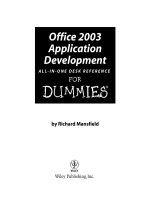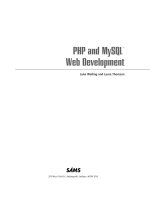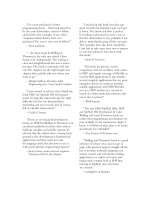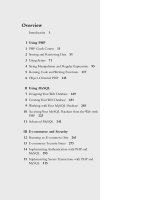For dummies PHP and MySQL web development all in one desk reference for dummies
Bạn đang xem bản rút gọn của tài liệu. Xem và tải ngay bản đầy đủ của tài liệu tại đây (10.5 MB, 675 trang )
by Janet Valade with Tricia Ballad
and Bill Ballad
PHP & MySQL
®
Web Development
ALL-IN-ONE DESK REFERENCE
FOR
DUMmIES
‰
01_167779 ffirs.qxp 12/17/07 7:58 PM Page iii
01_167779 ffirs.qxp 12/17/07 7:58 PM Page ii
PHP & MySQL
®
Web Development
ALL-IN-ONE DESK REFERENCE
FOR
DUMmIES
‰
01_167779 ffirs.qxp 12/17/07 7:58 PM Page i
01_167779 ffirs.qxp 12/17/07 7:58 PM Page ii
by Janet Valade with Tricia Ballad
and Bill Ballad
PHP & MySQL
®
Web Development
ALL-IN-ONE DESK REFERENCE
FOR
DUMmIES
‰
01_167779 ffirs.qxp 12/17/07 7:58 PM Page iii
PHP & MySQL
®
Web Development All-in-One Desk Reference For Dummies
®
Published by
Wiley Publishing, Inc.
111 River Street
Hoboken, NJ 07030-5774
www.wiley.com
Copyright © 2008 by Wiley Publishing, Inc., Indianapolis, Indiana
Published by Wiley Publishing, Inc., Indianapolis, Indiana
Published simultaneously in Canada
No part of this publication may be reproduced, stored in a retrieval system or transmitted in any form or
by any means, electronic, mechanical, photocopying, recording, scanning or otherwise, except as permit-
ted under Sections 107 or 108 of the 1976 United States Copyright Act, without either the prior written
permission of the Publisher, or authorization through payment of the appropriate per-copy fee to the
Copyright Clearance Center, 222 Rosewood Drive, Danvers, MA 01923, (978) 750-8400, fax (978) 646-8600.
Requests to the Publisher for permission should be addressed to the Legal Department, Wiley Publishing,
Inc., 10475 Crosspoint Blvd., Indianapolis, IN 46256, (317) 572-3447, fax (317) 572-4355, or online at
/>Trademarks: Wiley, the Wiley Publishing logo, For Dummies, the Dummies Man logo, A Reference for the
Rest of Us!, The Dummies Way, Dummies Daily, The Fun and Easy Way, Dummies.com, and related trade
dress are trademarks or registered trademarks of John Wiley & Sons, Inc. and/or its affiliates in the United
States and other countries, and may not be used without written permission. MySQL is a registered trade-
mark of MySQL Limited AB Company. All other trademarks are the property of their respective owners.
Wiley Publishing, Inc., is not associated with any product or vendor mentioned in this book.
LIMIT OF LIABILITY/DISCLAIMER OF WARRANTY: THE PUBLISHER AND THE AUTHOR MAKE NO REPRESENTATIONS
OR WARRANTIES WITH RESPECT TO THE ACCURACY OR COMPLETENESS OF THE CONTENTS OF THIS WORK AND
SPECIFICALLY DISCLAIM ALL WARRANTIES, INCLUDING WITHOUT LIMITATION WARRANTIES OF FITNESS FOR A
PARTICULAR PURPOSE. NO WARRANTY MAY BE CREATED OR EXTENDED BY SALES OR PROMOTIONAL MATERIALS.
THE ADVICE AND STRATEGIES CONTAINED HEREIN MAY NOT BE SUITABLE FOR EVERY SITUATION. THIS WORK IS
SOLD WITH THE UNDERSTANDING THAT THE PUBLISHER IS NOT ENGAGED IN RENDERING LEGAL, ACCOUNTING,
OR OTHER PROFESSIONAL SERVICES. IF PROFESSIONAL ASSISTANCE IS REQUIRED, THE SERVICES OF A COMPE-
TENT PROFESSIONAL PERSON SHOULD BE SOUGHT. NEITHER THE PUBLISHER NOR THE AUTHOR SHALL BE LIABLE
FOR DAMAGES ARISING HEREFROM. THE FACT THAT AN ORGANIZATION OR WEBSITE IS REFERRED TO IN THIS
WORK AS A CITATION AND/OR A POTENTIAL SOURCE OF FURTHER INFORMATION DOES NOT MEAN THAT THE
AUTHOR OR THE PUBLISHER ENDORSES THE INFORMATION THE ORGANIZATION OR WEBSITE MAY PROVIDE OR
RECOMMENDATIONS IT MAY MAKE. FURTHER, READERS SHOULD BE AWARE THAT INTERNET WEBSITES LISTED IN
THIS WORK MAY HAVE CHANGED OR DISAPPEARED BETWEEN WHEN THIS WORK WAS WRITTEN AND WHEN IT
IS READ. FULFILLMENT OF EACH COUPON OFFER IS THE SOLE RESPONSIBILITY OF THE OFFEROR.
For general information on our other products and services, please contact our Customer Care
Department within the U.S. at 800-762-2974, outside the U.S. at 317-572-3993, or fax 317-572-4002.
For technical support, please visit www.wiley.com/techsupport.
Wiley also publishes its books in a variety of electronic formats. Some content that appears in print may
not be available in electronic books.
Library of Congress Control Number: 2007943295
ISBN: 978-0-470-16777-9
Manufactured in the United States of America
10 9 8 7 6 5 4 3 2 1
01_167779 ffirs.qxp 12/17/07 7:58 PM Page iv
About the Author
Janet Valade is the author of PHP &MySQL For Dummies, which is in its third
edition. She has also written PHP & MySQL Everyday Apps For Dummies and
PHP & MySQL: Your visual blueprint for creating dynamic, database-driven Web
sites. In addition, Janet is the author of Spring into Linux and a co-author of
Mastering Visually Dreamweaver CS3 and Flash CS3 Professional.
Janet has 20 years of experience in the computing field. Most recently, she
worked as a Web designer and programmer in an engineering firm for four
years. Prior to that, Janet worked for 13 years in a university environment,
where she was a systems analyst. During her tenure, she supervised the
installation and operation of computing resources, designed and developed
a data archive, supported faculty and students in their computer usage,
wrote numerous technical papers, and developed and presented seminars
on a variety of technology topics.
01_167779 ffirs.qxp 12/17/07 7:58 PM Page v
01_167779 ffirs.qxp 12/17/07 7:58 PM Page vi
Dedication
This book is dedicated to everyone who finds it useful.
Author’s Acknowledgments
First, I wish to express my appreciation to the entire open source community.
Without those who give their time and talent, there would be no cool PHP
and MySQL for me to write about. Furthermore, I never would have learned
this software without the lists where people generously spend their time
answering foolish questions from beginners.
I want to thank my mother for passing on a writing gene, along with many
other things. And my children always for everything.
And, of course, I want to thank the professionals who make it all possible.
Without my agent and the people at Wiley Publishing, Inc., this book would
not exist. Because they all do their jobs so well, I can contribute my part to
this joint project.
01_167779 ffirs.qxp 12/17/07 7:58 PM Page vii
Publisher’s Acknowledgments
We’re proud of this book; please send us your comments through our online registration form
located at www.dummies.com/register/.
Some of the people who helped bring this book to market include the following:
Acquisitions, Editorial, and
Media Development
Project Editor: Jean Nelson
Acquisitions Editor: Kyle Looper
Copy Editor: Virginia Sanders
Technical Editor: Ryan Lowe
Editorial Manager: Kevin Kirschner
Media Development Project Manager:
Laura Moss-Hollister OR Laura Atkinson
Media Development Assistant Producer:
Angela Denny, Josh Frank, Kate Jenkins,
OR Kit Malone
Editorial Assistant: Amanda Foxworth
Sr. Editorial Assistant: Cherie Case
Cartoons: Rich Tennant
(www.the5thwave.com)
Composition Services
Project Coordinator: Erin Smith
Layout and Graphics: Claudia Bell, Carl Byers,
Joyce Haughey, Melissa K. Jester,
Barbara Moore, Ronald Terry,
Christine Williams
Proofreaders: John Greenough, Caitie Kelly,
Christine Sabooni
Indexer: Silvoskey Indexing Services
Special Help: Susan Christopherson,
Kelly Ewing, and Laura K. Miller
Publishing and Editorial for Technology Dummies
Richard Swadley, Vice President and Executive Group Publisher
Andy Cummings, Vice President and Publisher
Mary Bednarek, Executive Acquisitions Director
Mary C. Corder, Editorial Director
Publishing for Consumer Dummies
Diane Graves Steele, Vice President and Publisher
Joyce Pepple, Acquisitions Director
Composition Services
Gerry Fahey, Vice President of Production Services
Debbie Stailey, Director of Composition Services
01_167779 ffirs.qxp 12/17/07 7:58 PM Page viii
Contents at a Glance
Introduction 1
Book I: Setting Up Your Environment 7
Chapter 1: Setting Up Your Web Environment 9
Chapter 2: Installing PHP 21
Chapter 3: Setting Up the MySQL Environment 47
Chapter 4: Installing a Web Server 73
Chapter 5: Setting Up Your Web Development Environment
with the XAMPP Package 87
Book II: PHP Programming 101
Chapter 1: PHP Basics 103
Chapter 2: Building PHP Scripts 151
Chapter 3: PHP and Your Operating System 197
Chapter 4: Object-Oriented Programming 229
Book III: Using MySQL 257
Chapter 1: Introducing MySQL 259
Chapter 2: Administering MySQL 269
Chapter 3: Designing and Building a Database 295
Chapter 4: Using the Database 319
Chapter 5: Communicating with the Database from PHP Scripts 343
Book IV: Security 357
Chapter 1: General Security Considerations 359
Chapter 2: An Overview of Authentication and Encryption 373
Chapter 3: Creating a Secure Environment 383
Chapter 4: Programming Securely in PHP 397
Chapter 5: Programming Secure E-Commerce Applications 409
Book V: PHP Extensions 421
Chapter 1: Introduction to Extensions 423
Chapter 2: Using PEAR 429
Chapter 3: Using the XML Extension 441
Chapter 4: Manipulating Images with the GD Extension 449
Chapter 5: Mail Extensions 459
02_167779 ftoc.qxp 12/17/07 8:00 PM Page ix
Book VI: PHP Web Applications 467
Chapter 1: Building and Processing Dynamic Forms 469
Chapter 2: Making Information Available on Multiple Web Pages 511
Chapter 3: Building a Login Application 533
Chapter 4: Building an Online Catalog 555
Chapter 5: Building a Shopping Cart 571
Index 617
02_167779 ftoc.qxp 12/17/07 8:00 PM Page x
Table of Contents
Introduction 1
About This Book 1
Conventions Used in This Book 2
What You’re Not to Read 3
Foolish Assumptions 4
How This Book Is Organized 4
Book I: Setting Up Your Environment 4
Book II: PHP Programming 5
Book III: Using MySQL 5
Book IV: Security 5
Book V: PHP Extensions 5
Book VI: PHP Web Applications 5
Companion Web site 5
Icons Used in This Book 6
Getting Started 6
Book I: Setting Up Your Environment 7
Chapter 1: Setting Up Your Web Environment . . . . . . . . . . . . . . . . . . . . .9
The Required Tools 10
Choosing a Host for Your Web Site 10
A company Web site 11
An educational institution 12
A Web-hosting company 13
Using a hosted Web site 15
Choosing Your Development Environment 16
Setting Up Your Local Computer for Development 17
Installing the Web server 17
Installing MySQL 18
Installing PHP 18
Getting help with your software 19
Keeping Up with PHP and MySQL Changes 19
Chapter 2: Installing PHP . . . . . . . . . . . . . . . . . . . . . . . . . . . . . . . . . . . . . .21
Checking the PHP Installation 22
Obtaining PHP 22
Downloading from the PHP Web site 22
Obtaining PHP for Windows 23
02_167779 ftoc.qxp 12/17/07 8:00 PM Page xi
PHP & MySQL Web Development All-in-One Desk Reference For Dummies
xii
Obtaining PHP for Linux 23
Obtaining PHP for the Mac OS 24
Obtaining all-in-one installation kits 24
Verifying a downloaded file 24
Installing PHP 25
Installing on Unix and Linux 26
Before installing 26
Installing 27
Installing on Mac OS X 28
Before installing 28
Installing 29
Installation options for Unix/Linux/Mac 31
Installing on Windows 32
Configuring Your Web Server for PHP 33
Configuring Apache on Linux and Mac 33
Configuring your Web server on Windows 34
Configuring Apache on Windows 34
Configuring IIS 35
Configuring PHP 36
Testing PHP 38
Activating MySQL Support 39
Activating MySQL support on Linux and the Mac OS 40
Activating MySQL support on Windows 40
Configuring PHP for MySQL support 40
Setting up the MySQL support files 40
Checking MySQL support 42
Troubleshooting 42
Unable to change PHP settings 43
Displays error message: Undefined function 44
Windows 44
Linux or Mac 44
MySQL functions not activated (Windows) 44
Displays a blank page or HTML output only 45
Chapter 3: Setting Up the MySQL Environment . . . . . . . . . . . . . . . . . . .47
Checking the MySQL Installation 48
Obtaining MySQL 49
Downloading from the MySQL Web site 50
Obtaining MySQL for Windows 50
Obtaining MySQL for Linux and Unix 50
Obtaining MySQL for Mac 51
Obtaining all-in-one installation kits 51
Verifying a downloaded file 52
Installing MySQL 52
Installing MySQL on Windows 52
Running the MySQL Setup Wizard 53
Running the MySQL Configuration Wizard 55
02_167779 ftoc.qxp 12/17/07 8:00 PM Page xii
Table of Contents
xiii
Installing MySQL on Linux from an RPM file 57
Installing MySQL on Mac from a PKG file 57
Installing MySQL from source files 58
Configuring MySQL 60
Starting and Stopping the MySQL Server 61
Controlling the server on Windows 61
Windows NT/2000/XP/Vista 61
Manual shutdown 62
Windows 98/Me 62
Controlling the MySQL server on Linux/Mac 63
Testing MySQL 63
Troubleshooting MySQL 64
Displays error message: Access denied 64
Displays error message: Client does not support
authentication protocol 65
Displays error message: Can’t connect to . . 65
MySQL error log 66
Installing MySQL GUI Administration Programs 66
Installing phpMyAdmin 67
Obtaining phpMyAdmin 67
Installing phpMyAdmin 67
Testing phpMyAdmin 69
Troubleshooting phpMyAdmin 71
Chapter 4: Installing a Web Server . . . . . . . . . . . . . . . . . . . . . . . . . . . . .73
Testing Your Web Server 73
Installing and Configuring Apache 74
Obtaining Apache 74
Selecting a version of Apache 74
Downloading from the Apache Web site 75
Obtaining Apache for Windows 75
Obtaining Apache for Linux 76
Obtaining Apache for Mac 76
Obtaining all-in-one installation kits 76
Verifying a downloaded file 77
Installing Apache 77
Installing Apache on Windows 77
Installing Apache on a Mac 79
Installing Apache from source code on Linux and Mac 79
Starting and stopping Apache 81
Starting and stopping Apache on Windows 81
Starting Apache on Linux, Unix, and Mac 81
Restarting Apache on Linux, Unix, and Mac 82
Stopping Apache on Linux, Unix, and Mac 82
Getting information from Apache 83
Getting Apache information on Windows 83
Getting Apache information on Linux, Unix, and Mac 83
02_167779 ftoc.qxp 12/17/07 8:00 PM Page xiii
PHP & MySQL Web Development All-in-One Desk Reference For Dummies
xiv
Configuring Apache 84
Changing settings 84
Changing the location of your Web space 85
Changing the port number 85
Installing IIS 86
Chapter 5: Setting Up Your Web Development Environment
with the XAMPP Package . . . . . . . . . . . . . . . . . . . . . . . . . . . . . . . . . . . . .87
Obtaining XAMPP 88
Installing XAMPP 88
Using the XAMPP Control Panel 91
Testing Your Development Environment 92
Opening the XAMPP Web page 93
Testing phpMyAdmin 94
Testing PHP 94
Configuring Your Development Environment 95
Configuring PHP 96
Configuring Apache 97
Configuring MySQL 97
Uninstalling and Reinstalling XAMPP 97
Troubleshooting 98
Book II: PHP Programming 101
Chapter 1: PHP Basics . . . . . . . . . . . . . . . . . . . . . . . . . . . . . . . . . . . . . . .103
How PHP Works 103
Structure of a PHP Script 105
PHP Syntax 107
Using simple statements 107
Using complex statements 108
Writing PHP Code 109
Displaying Content in a Web Page 110
Using PHP Variables 113
Naming a variable 113
Creating and assigning values to variables 114
Using variable variables 115
Displaying variable values 116
Using variables in echo statements 116
Displaying variables with print_r statements 117
Displaying variables with var_dump statements 118
Using PHP Constants 118
02_167779 ftoc.qxp 12/17/07 8:00 PM Page xiv
Table of Contents
xv
Understanding Data Types 119
Working with integers and floating-point numbers 120
Performing arithmetic operations on numeric
data types 120
Using arithmetic operators 121
Formatting numbers as dollar amounts 122
Working with character strings 123
Assigning strings to variables 123
Using single and double quotes with strings 124
Joining strings 125
Storing really long strings 126
Working with the Boolean data type 127
Working with the NULL data type 127
Using Arrays 128
Creating arrays 128
Viewing arrays 129
Removing values from arrays 130
Sorting arrays 131
Getting values from arrays 133
Walking through an array 134
Manually walking through an array 134
Using foreach to walk through an array 135
Multidimensional arrays 137
Using Dates and Times 138
Setting local time 139
Formatting a date 139
Storing a timestamp in a variable 141
Understanding PHP Error Messages 142
Types of PHP error messages 142
Understanding parse errors 142
Understanding fatal errors 143
Understanding warnings 143
Understanding notices 144
Understanding strict messages 144
Displaying error messages 145
Turning off error messages 145
Displaying selected messages 145
Suppressing a single error message 146
Logging error messages 147
Logging errors 147
Specifying the log file 147
Adding Comments to Your PHP Script 148
02_167779 ftoc.qxp 12/17/07 8:00 PM Page xv
PHP & MySQL Web Development All-in-One Desk Reference For Dummies
xvi
Chapter 2: Building PHP Scripts . . . . . . . . . . . . . . . . . . . . . . . . . . . . . . .151
Setting Up Conditions 152
Comparing values 152
Checking variable content 154
Pattern matching with regular expressions 155
Using special characters in patterns 155
Considering some example patterns 156
Using PHP functions for pattern matching 158
Joining multiple comparisons 159
Using Conditional Statements 161
Using if statements 161
Building if statements 162
Negating if statements 164
Nesting if statements 165
Using switch statements 165
Repeating Actions with Loops 167
Using for loops 168
Building for loops 168
Nesting for loops 169
Designing advanced for loops 169
Using while loops 171
Using do while loops 174
Avoiding infinite loops 175
Breaking out of a loop 177
Using Functions 178
Creating a function 179
Using variables in functions 180
Passing values to a function 181
Passing the right type of values 182
Passing values in the correct order 183
Passing the right number of values 184
Passing values by reference 185
Returning a value from a function 186
Using built-in functions 189
Organizing Scripts 189
Separate display code from logic code 190
Reusing code 191
Organizing with functions 191
Organizing with include files 192
Including files 193
Using variables in include statements 193
Storing include files 194
Setting up include directories 195
02_167779 ftoc.qxp 12/17/07 8:00 PM Page xvi
Table of Contents
xvii
Chapter 3: PHP and Your Operating System . . . . . . . . . . . . . . . . . . . . .197
Managing Files 198
Getting information about files 198
Copying, renaming, and deleting files 200
Organizing files 201
Creating a directory 201
Building a list of all the files in a directory 202
Using Operating System Commands 204
Using backticks 205
Using the system function 207
Using the exec function 207
Using the passthru function 208
Error messages from system commands 208
Understanding security issues 209
Using FTP 210
Logging in to the FTP server 211
Getting a directory listing 212
Downloading and uploading files with FTP 212
Other FTP functions 214
Reading and Writing Files 215
Accessing files 216
Opening files in read mode 216
Opening files in write mode 217
Opening files on another Web site 217
Closing a file 218
Writing to a file 218
Reading from a file 218
Reading files piece by piece 219
Reading a file into an array 220
Reading a file into a string 221
Exchanging Data with Other Programs 221
Exchanging data in flat files 221
Exchanging data in comma-delimited format 222
Understanding comma-delimited format 222
Creating a comma-delimited file 223
Reading a comma-delimited file 223
Using other delimiters 223
Using SQLite 225
Chapter 4: Object-Oriented Programming . . . . . . . . . . . . . . . . . . . . . . .229
Introducing Object-Oriented Programming 229
Objects and classes 230
Properties 231
Methods 231
Inheritance 232
02_167779 ftoc.qxp 12/17/07 8:00 PM Page xvii
PHP & MySQL Web Development All-in-One Desk Reference For Dummies
xviii
Developing an Object-Oriented Script 232
Choosing objects 233
Selecting properties and methods for each object 233
Creating and using an object 234
Defining a Class 235
Writing a class statement 235
Setting properties 235
Accessing properties using $this 237
Adding methods 237
Understanding public and private properties and methods 240
Writing the constructor 242
Putting it all together 242
Using a Class in a Script 246
Using Abstract Methods in Abstract Classes and Interfaces 248
Using an abstract class 248
Using interfaces 249
Preventing Changes to a Class or Method 251
Handling Errors with Exceptions 251
Copying Objects 253
Comparing Objects 254
Getting Information about Objects and Classes 255
Destroying Objects 255
Book III: Using MySQL 257
Chapter 1: Introducing MySQL . . . . . . . . . . . . . . . . . . . . . . . . . . . . . . . .259
How MySQL Works 259
Understanding Database Structure 260
Communicating with MySQL 260
Building SQL queries 261
Sending SQL queries 262
Using the mysql client 263
Using administrative software 264
Protecting Your MySQL Databases 267
Chapter 2: Administering MySQL . . . . . . . . . . . . . . . . . . . . . . . . . . . . . .269
Understanding the Administrator Responsibilities 269
Default Access to Your Data 270
Controlling Access to Your Data 271
Account names and hostnames 272
Passwords 273
Account privileges 274
02_167779 ftoc.qxp 12/17/07 8:00 PM Page xviii
Table of Contents
xix
Setting Up MySQL Accounts 275
Identifying what accounts currently exist 277
Displaying account information with an SQL query 277
Displaying account information from phpMyAdmin 277
Adding accounts 278
Creating an account with an SQL query 278
Creating and account with phpMyAdmin 279
Adding and changing passwords 280
Changing passwords with an SQL query 280
Changing passwords with phpMyAdmin 280
Changing privileges 282
Changing privileges with an SQL query 282
Changing privileges with phpMyAdmin 283
Removing accounts 284
Removing an account with an SQL query 284
Removing an account with phpMyAdmin 284
Backing Up Your Database 285
Backing up a database with mysqldump 286
Backing up a database with phpMyAdmin 288
Restoring Your Data 290
Restoring your database using the mysql client 291
Restoring your database with phpMyAdmin 292
Upgrading MySQL 293
Chapter 3: Designing and Building a Database . . . . . . . . . . . . . . . . . .295
Designing a Database 295
Choosing the data 295
Organizing the data 296
Creating relationships between tables 300
Storing different types of data 301
Character data 301
Numerical data 302
Date and time data 302
Enumeration data 302
MySQL data type names 303
Designing a sample database 304
Writing down your design 307
Building a Database 308
Creating a new database 309
Creating an empty database with an SQL query 309
Creating an empty database with phpMyAdmin 310
Creating and deleting a database 310
Deleting a database with an SQL query 310
Deleting a database with phpMyAdmin 310
02_167779 ftoc.qxp 12/17/07 8:00 PM Page xix
PHP & MySQL Web Development All-in-One Desk Reference For Dummies
xx
Adding tables to a database 311
Adding tables to a database with SQL queries 311
Adding tables to a database with phpMyAdmin 314
Removing a table 316
Removing a table with an SQL query 316
Removing a table with phpMyAdmin 316
Changing the Database Structure 316
Changing the database structure with SQL queries 316
Changing the database structure with phpMyAdmin 317
Chapter 4: Using the Database . . . . . . . . . . . . . . . . . . . . . . . . . . . . . . . .319
Adding Information to a Database 320
Adding one row at a time 320
Adding a row of data in an SQL query 321
Adding a row of data with phpMyAdmin 322
Adding a bunch of data 324
Adding data from a data file with an SQL query 325
Adding data from a data file with phpMyAdmin 326
Looking at the Data in a Database 327
Browsing the data with SQL queries 327
Browsing the data with phpMyAdmin 327
Retrieving Information from a Database 328
Retrieving specific information 329
Retrieving data in a specific order 331
Retrieving data from specific rows 331
Using a WHERE clause 332
Using the LIMIT keyword 334
Using the DISTINCT keyword 334
Combining information from more than one table 334
UNION 335
Join 336
Updating Information in a Database 339
Updating information with SQL queries 339
Updating information with phpMyAdmin 339
Removing Information from a Database 340
Removing information with an SQL query 340
Removing information with phpMyAdmin 341
Chapter 5: Communicating with the Database
from PHP Scripts . . . . . . . . . . . . . . . . . . . . . . . . . . . . . . . . . . . . . . . . . . . .343
How MySQL and PHP Work Together 343
PHP Functions That Communicate with MySQL 344
Communicating with MySQL 344
Connecting to the MySQL server 345
Sending an SQL query 347
Sending multiple queries 348
02_167779 ftoc.qxp 12/17/07 8:00 PM Page xx
Table of Contents
xxi
Selecting a Database 349
Handling MySQL Errors 349
Using Other Helpful mysqli Functions 351
Counting the number of rows returned by a query 351
Determining the last auto entry 352
Counting affected rows 353
Escaping characters 353
Converting mysqli Functions to mysql Functions 354
Book IV: Security 357
Chapter 1: General Security Considerations . . . . . . . . . . . . . . . . . . . .359
Understanding Security Roles 359
Understanding Security Threats 361
Developing a Security Policy 363
Components of a strong security policy 364
A sample security policy 365
Section 1: ABC Web Development: Security Mission
Statement 365
Section 2: Identification of Responsible Security
Personnel 365
Section 3: Ensuring Physical Security 366
Section 4: Policy on Antivirus and Patch Management 366
Section 5: Backup and Disaster Recovery 367
Section 6: Change Control Process 369
Chapter 2: An Overview of Authentication and Encryption . . . . . . . .373
Understanding Authentication 373
Passwords 374
Lost lost lost 374
Stolen or guessed passwords 375
Storing passwords 376
Image recognition 376
Accessibility issues 377
Implementing image recognition 377
Digital identities 378
Digital signatures 379
Digital certificates 380
Exploring Encryption 380
Basic concepts and terminology 380
Salt 380
Encryption strength 381
One-way encryption 381
Public key encryption 381
Hash functions 382
02_167779 ftoc.qxp 12/17/07 8:00 PM Page xxi
PHP & MySQL Web Development All-in-One Desk Reference For Dummies
xxii
Chapter 3: Creating a Secure Environment . . . . . . . . . . . . . . . . . . . . . .383
Securing Apache 383
Securing PHP applications with SuExec 383
ModSecurity 384
Securing IIS 385
Reducing the server’s footprint 385
Securing the Web root 387
Setting Security Options in php.ini 395
Chapter 4: Programming Securely in PHP . . . . . . . . . . . . . . . . . . . . . .397
Handling Errors Safely 397
Understanding the dangers 397
Testing for unexpected input 399
Handling the unexpected 400
Checking all form data 401
Sanitizing Variables 401
Converting HTML special characters 401
Sanitizing e-mail addresses 402
Uploading Files without Compromising the Filesystem 403
Avoiding DoS attacks on the filesystem 404
Validating files 404
Using FTP functions to ensure safe file uploads 405
Securing the sandbox 406
Chapter 5: Programming Secure E-Commerce Applications . . . . . .409
Securing Your Database 409
Securing the database 410
Choose a database user 410
Be stingy with privileges 411
Storing connection strings and passwords 411
Store connection strings separately 411
Encrypt all stored passwords 412
Sending Encrypted Data with Secure Sockets Layer 412
Obtaining a digital certificate 412
Creating a digital certificate 414
Using Apache’s mod_SSL 415
Keeping Sessions Secure 415
Use cookies 415
Set session timeouts 416
Regenerate session IDs 417
Preventing Cross-Site Scripting 417
How an XSS attack works 417
Preventing XSS 418
02_167779 ftoc.qxp 12/17/07 8:00 PM Page xxii









